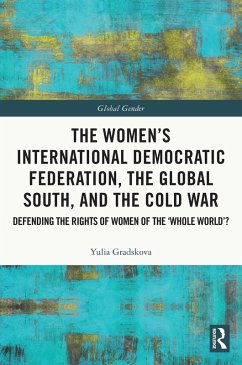Dieser Download kann aus rechtlichen Gründen nur mit Rechnungsadresse in A, B, BG, CY, CZ, D, DK, EW, E, FIN, F, GR, HR, H, IRL, I, LT, L, LR, M, NL, PL, P, R, S, SLO, SK ausgeliefert werden.
"This timely book makes an important contribution not only to the history of the Women's International Democratic Federation as an organisation and the issues it dealt with, but also to the study of post-war women's rights movements in global and transnational perspective. It offers an interpretation of the dynamics of the Cold War that transcends superpower antagonism by focusing on grass roots campaigning and makes an important contribution to on-going debates about the impact of post-colonialism and anti-racism."
- Melanie Ilic, Professor of Soviet History, University of Gloucestershire, and author of Soviet Women - Everyday Lives
"In the throes of the Cold War, Second World and Third World women crafted an alternative to the Western vision for winning equality for "women of the whole world." Yulia Gradskova deftly unearths the story of their complex interactions in the largest transnational women's organization on the global stage, showing how women from the Global South welded gender equality and human rights to anti-racism and anti-colonialism. It's an inspiring story with unmistakable relevance for today."
- Leila J. Rupp, Distinguished Professor of Feminist Studies, University of California, Santa Barbara, and author of Worlds of Women: The Making of an International Women's Movement
"Yulia Gradskova's pioneering study offers fresh insights into the complex history of the WIDF, one of the world's most important international women's organizations. She sheds new light on the diverse motivations of individual members, motivations often quite independent from the official (and changing) goals of the organization. This book presents convincing evidence that the work of women activists from different continents represented more than simple reflections of Cold War ideologies."
Jadwiga E. Pieper Mooney, Associate Professor of History, University of Arizona, author of The Politics of Motherhood: Maternity and Women's Rights in Twentieth Century Chile.
"'Drawing on the archives of the Committee of Soviet Women, Gradskova offers a fresh perspective on the history of the Women's International Democratic Federation during the Cold War, and asks important questions about the role of "Moscow" in forging connections with women's movements in the global South."
Celia Donert, University Lecturer in Central European History, University of Cambridge


